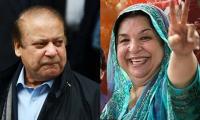The Sindh Child Marriage Restraining Act 2013 has been challenged in the Sindh High Court as “against the injunction of Islam and the constitution”, which cannot be applied to the Muslims.
Petitioner Ali Azhar submitted that he married Arzoo Fatima after she converted to Islam on October 13, 2020, but she was not being allowed to live with him due to the Sindh Child Marriage Restraining Act 2013.
He submitted that vires of the act are against the injunction of Islam and are therefore not applicable to the Muslims. He submitted that the family judge has to decide each and every issue of Muslim marriage in light of the Muslim law according to their religion. He submitted that he filed a suit in a family court for the restitution of conjugal rights, but it was dismissed by the court and the appellate court.
The petitioner further said that the family and appellate courts did not apply their judicial mind, legal aspects, factual issues and evidence available on record as well as the guidelines issued by the superior courts that when there was conflict between the law of the land and the injunction of Islam, the injunction of Islam shall prevail. He argued that the trial court erred in law and circumstances, which caused serious miscarriage of justice. He submitted that it is an admitted fact that throughout the Sindh Child Marriage Restraining Act, the marriage of spouses has not been declared illegal.
He submitted that under the Muslim laws, the right of marriage is established when the spouses reach the puberty age. He requested the court to set aside the family court order.
The high court was requested to declare that the vires of Sindh Child Marriage Restraining Act 2013 are against the injunction of Islam and constitution, and as such not applicable to the Muslims. He sought declaration that the definition of child given in the act would be applied with signs of puberty for Muslims.
He sought the issuance of a direction to the Sindh government and the Council of Islamic Ideology to pursue the law and formulate the same in conjunction with Islam and to make necessary amendments which are not in conflict with Islam.
The petitioner also requested the court to declare that the marriage of the petitioner with Arzoo was legal and lawful and executable under the Muslim family law.
On November 23, the SHC had sent Arzoo to a shelter home as she could not be sent with her spouse after a medical board report declared her age to be 13 to 14 years. The court observed that as Arzoo does not want to go with her parents, she may be kept at the shelter home and a social welfare department officer shall ensure her welfare in terms of physical and mental wellbeing, schooling and any other matter of concern.
The court observed that Arzoo may ponder over her life choices and ordered that she be allowed to meet those persons whom she agrees to meet, excluding her ex-spouse Ali Azhar and his relatives.
Arzoo had categorically stated before the court that she had converted to Islam of her own free will, she had not been kidnapped by any party, and that she had entered into the marriage contract of her own free will.
The court observed that as per the medical, Nadra and school record, the girl was about 13 years old, and it was apparent that she was underage and it was not possible for her to enter into legally valid marriage with Ali Azhar under the Sindh Child Marriage Restraining Act. It said the girl could not be returned to him.
Mazar-E-Quaid can be seen in Karachi. — AFP/FileCelebrating ShakespeareThe National Academy of Performing Arts is...
Mr. Jamil Khan, ABL Group Chief CRBG South presents Rs. 1 million cheque to Fatimid Foundation Executive...
Awami National Party supporters during a party rally on January 25, 2024. — Facebook/ANP Khyber PakhtunkhwaThe...
This representational image shows speakers reading their poetry during a session of the Aalmi Mushaira. — Arts...
ACP President Muhammad Ahmed Shah addresses the opening ceremony of Sindh Theatre Festival 2024 Sukkur along with...
The Sindh High Court building. — SHC website/FileThe Sindh High Court on Monday repeated notice to Pakistan Peoples...







